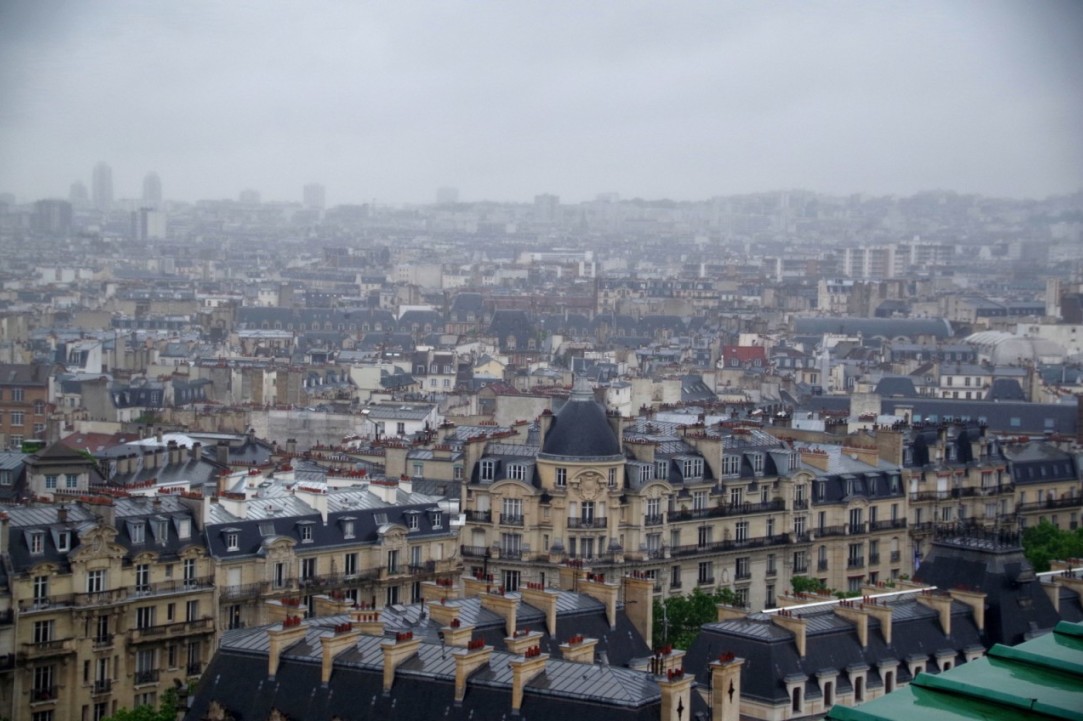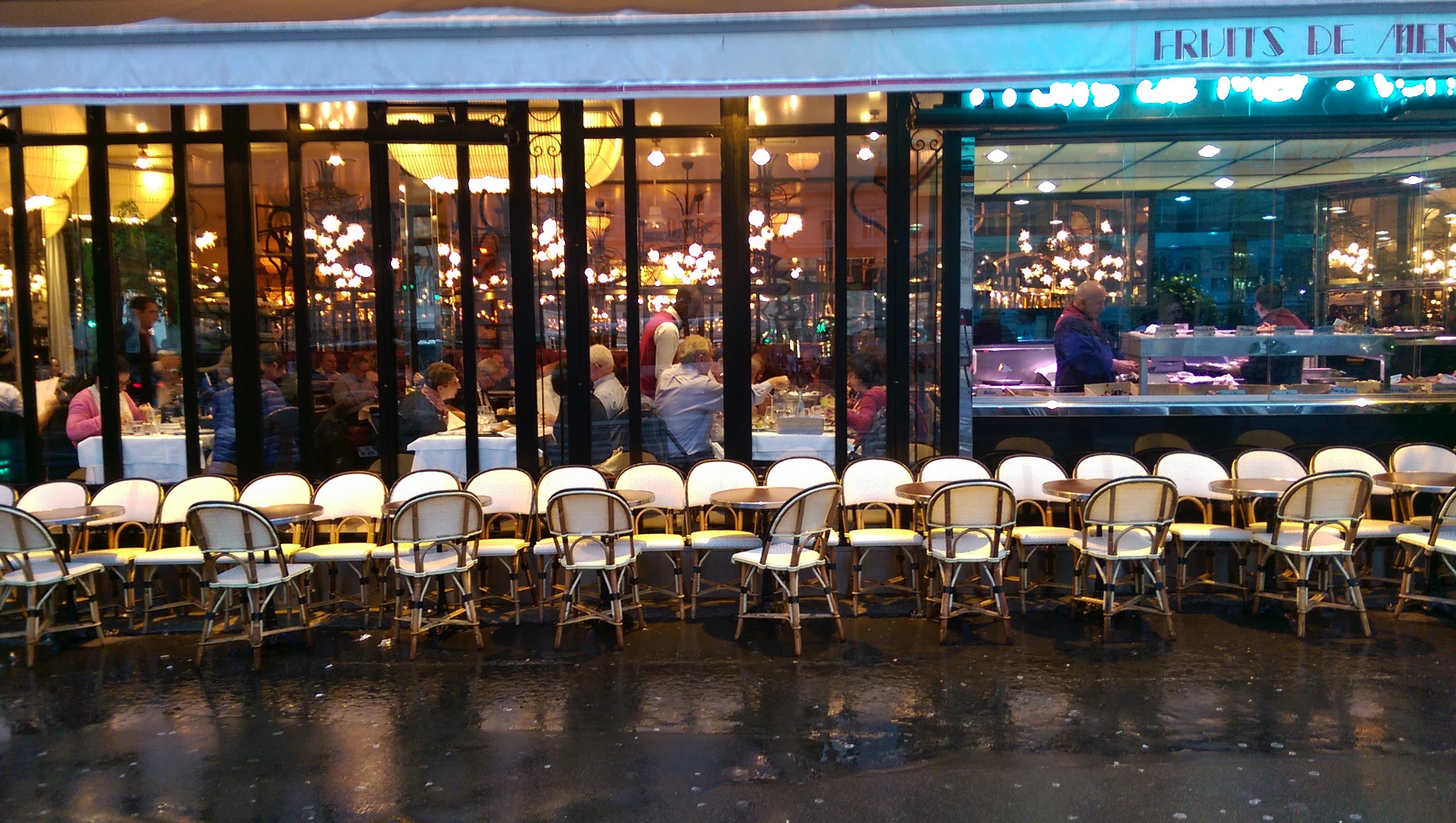HSE Graduate School of Urbanism and D’est Organize Joint Summer School in France
The HSE Vysokovsky Graduate School of Urbanism together with the French association D’est are organizing a joint summer school this year in France. The School will run from June 25 – July 8, 2017 in Paris and Montpellier and aims to attract students and young professionals in urban development and planning, municipal administration, and civil initiatives.

Roofs of Paris by Viktoria Andreeva, participant of the 2016 School
The School’s key focus in 2017 will be housing policies. This was not a random choice, since France has extensive experience of large-scale post-war housing initiatives. This type of housing construction was also seen in Russia. Today, both countries are facing the consequences of these development projects, such as serious social segregation in French suburbs, and lost profit in Russia. As part of the Summer School, we will try to find common ground in contemporary housing policies in Moscow and Paris.
The idea of the School dates back to 2015, when Nina Berezner, President of D’est Association, developed a programme for the first Summer School in France. This initiative was supported by Alexey Novikov, Dean of the Graduate School of Urbanism (GSU), and six HSE students and staff members, as well as urban activists from Krasnoyarsk and Moscow (Zuzino Shtab) went on to take part in the first school in 2015. The second Summer School was held in 2016. It attracted young professionals, including HSE students, from Moscow, St. Petersburg, Saratov, Samara, Magadan, Yaroslavl, Veliky Novgorod, Vologda, Kazan, and Troitsk.

Meeting at the Guild of Architects of Île-de-France. Photo by Ruslan Sabirov, participant of the 2016 School.
The joint GSU and D’est Summer School has three main goals. First, it builds relations between the French and Russian expert communities and members of the public who are actively involved in urban development. Second, it draws the attention of French politicians and public figures to issues surrounding urban development in Russia. It also aims to create an open platform for experience exchange and professional dialogue.
The Graduate School of Urbanism held a student competition for those interested in taking part in the 2017 School. Applicants had to submit a motivation letter, recommendations from teachers, and pass an interview. A lot of interesting applications came in, and it was difficult to select the finalists. In 2017, the winners were five first-year students: Alena Avdeeva, Maria Golovenkina, Elena Skrebkova, Nikita Suchkov, and Marianna Shkurko. The selected students are also involved in the research part of the programme, which is taking place in Moscow and focuses on the key topic of this year’s School: housing policies.
HSE students in this year’s school
Alena Avdeeva, first-year MA student, Graduate School of Urbanism
For me, taking part in the Summer School is an opportunity to get a better understanding of urbanists’ work aimed at improving the comfort and quality of living in the city; to get an experience of interdisciplinary team work; and to study the practices of involving the residents in the activities and the ways to resolve urban conflicts. I’m also willing to look at some practices of residential construction and spatial planning as an alternative to the Russian ones, to analyze and evaluate their effectiveness.
Visit to a construction site at a new district in Limoges. Photo by Ekaterina Dyba, Summer School curator.
Maria Golovenkina, first-year MA student, Graduate School of Urbanism
‘The Paris Summer School will help me understand how urban residents can be helped to take a regular and active role in urban planning. Practical understanding of Paris’ experience as part of the 2017 Summer School will give us an opportunity to assess its potential application in Russian cities.’

Meeting at the Guild of Architects of Île-de-France: Christine Leconte, Secretary General of the Guild, Marine De La Guerrande, Vice President of the Guild, Rémi Féraud, Mayor of the 10th arrondissement, Paris, and Nina Berezner, President of D’est Association
Nikita Suchkov, MA student, Graduate School of Urbanism
‘The topic of my term paper is The Problem of Redeveloping Residential Housing of the 1920s – 1930s. My hypothesis is that successful redevelopment is only possible when there is a club model of management, i.e. when residential blocks have one decision-making centre that can unite the owners’ efforts. Studying international experiences is a vital part of considering and understanding this topic. I believe that participation in the Summer School Les Ateliers d’Eté will allow me expand my view of this topic and will help me understand how housing policies are implemented regarding cultural heritage objects.’

Street café in Paris. Photo by Viktoria Andreeva, participant of the 2016 School.
Elena Skrebkova, first-year student, Graduate School of Urbanism
‘Urbanism is, first of all, studying the fundamental principles of how a city works. That’s why the summer school in France on housing policy is a unique opportunity to investigate this issue, which is vital for any city. I’d like to understand how housing policies have been evolving in a city that has a developed market economy, and also to see what approaches to urban design and development are applied in France. I believe it’s essential to understand the global trends in urban housing policies, how decisions are made and approved, how citizens’ property regarding housing works, how accessible housing is, and also to gain an insight into the volumes of housing construction.’
Espaces d'Abraxas, a major architectural complex by Ricardo Bofill. Photo by Ekaterina Dyba, curator of the Summer School.
Marianna Shkurko, first-year MA student, Graduate School of Urbanism
‘Housing policies can be described as an area in which private and public interests meet. We can clearly understand who the end customer here is, but there’s still an open question as to who makes the decisions. Do the authorities have an a priori monopoly on decision-making? What do decisions mean – consensus, compromise, authoritarian approval, or something else? How to balance the interests of those who design and those who use? I would like to find the answers to these questions at the Summer School. On the other hand, I’m interested in learning more about the urban construction practices implemented in various countries, in order to adopt and disseminate these experiences.
On behalf of GSU, the curators of the school are Alexey Novikov, Vitaly Stadnikov, Vera Leonova, Ekaterina Dyba, and Marina Sapunova.
The intense two-week programme of lectures and workshops will consist of several key sections:
- Urban planning system in France and the Paris agglomeration;
- Current housing construction projects with visits to construction sites;
- Involving urban residents in decision-making systems, participatory practices, urban activism;
- Meetings with representatives of municipalities, APUR (Paris Urban Planning Agency), Paris School of Urbanism (l’École d’Urbanisme de Paris), Institute of Urban Planning (IAU), French Housing Improvement Agency (ANAH), and local activists.
The School is organized with the support of the French Embassy in Russia and the Administration of Paris.
Ekaterina Dyba
Vera Leonova
Alexei Novikov
Marina Sapunova
Vitaly Stadnikov
See also:
From Sequencing to Constructing a Cardio Panel: Summer School in Cardiogenetics
From August 19 to 29, the Continuing Professional Development Centre of the HSE Faculty of Computer Science hosted the summer school 'Cardiogenetics: From Sequencing to Constructing a Cardio Panel,' organised in collaboration with the Russian Academy of Sciences' Institute of Analytical Instrumentation (IAI) and Institute of Spectroscopy (ISAN), and the Syntol company. The summer school was conducted within the framework of the Federal Research Programme for Genetic Technologies Development for 2019–2027 (Project 15.IP.21.0004).
'These Are Unforgettable Impressions, I Will Cherish Them Forever'
HSE St Petersburg International Summer School is in full swing—right now, international students from 12 countries are attending lectures and enjoying the cultural programme. The HSE News Service talked to the participants about their most vivid impressions.
HSE University-St Petersburg Hosts Students from 12 Countries at the International Summer School
On July 10, HSE University-St Petersburg launched the International Summer School—a series of classes for students from India, Vietnam, the Republic of Korea and other countries. Foreign guests are getting to know the university, attending lectures in six fields of study, and enjoying an inspiring cultural programme.
The XI Russian-Chinese Summer School on International Relations Kicks Off at HSE University
On July 1, 2024, the opening ceremony of the XI International Russian-Chinese Summer School on International Relations, titled ‘Partnership and Cooperation in the New World Order,’ took place. The event was organised by the HSE Faculty of World Economy and International Affairs in collaboration with HSE Centre for Comprehensive European and International Studies (CCEIS). Graduate and postgraduate students from various countries have come to Moscow to study international relations and collectively envision a new world order.
HSE University Holds 10th Summer School ‘Eye-tracking in the Lab and Beyond’
This year, more than 100 students from Russia and abroad took part in the 10th summer neurolinguistic school, ‘Eye-tracking in the Lab and Beyond’. The school is held annually by the HSE Center for Language and Brain. Leading experts spoke about advanced developments and research in the field of video-oculography.
Data Analysis and Personalised Medicine: Summer School in Cardiogenetics
The Continuing Professional Development Centre of the HSE Faculty of Computer Science has recently hosted the summer school 'Cardiogenetics: From Sequencing to Constructing a Cardio Panel'. The school programme was co-organised by the Russian Academy of Sciences' Institute of Analytical Instrumentation and Institute of Spectroscopy and the Syntol company.
‘Interest in the Application of Machine Learning in Bioinformatics Is Growing by the Year’
On August 28–30, HSE University’s Faculty of Computer Science held the 4th Summer School on Machine Learning in Bioinformatics. This year, 670 people registered for the event, and over 300 visited in person. The programme included lectures and seminars on various spheres of bioinformatics: applied bioinformatics and the bioinformatics of DNA, RNA, and proteins; elementary genomics; modern methods of data analysis and molecular biology. The lectures were complemented by practical tasks aimed at different levels of knowledge.
HSE Faculty of Computer Science Holds Summer School on Software Engineering
At the beginning of July, a summer school on software engineering was held at the HSE Faculty of Computer Science. This is the successor to the school on mobile applications development, which was held at the FCS from 2015 to 2022. The school’s partners for this event included 1C, Sber, the community of authors of the Indicator games, and the Samsung Innovation Campus IT School.
‘This Summer School Made Me Realise How Important Data Analytics Actually Is Nowadays’
From July 4–8, the 14th Summer School ‘Methods and Tools for Analysing Social Networks’ was held by the International Laboratory for Applied Network Research (ANR Lab). The dissemination of knowledge about the most recent methods of network analysis is one of the goals of the laboratory. Social network analysis is an interdisciplinary field that studies networks of interactions between different objects (such as people, organisations, institutions, countries, words in texts, texts on the internet) and identifying hidden patterns within them.
HSE Faculty of Computer Science Holds Summer School on Entrepreneurship
In early July, HSE Faculty of Computer Science held the 2nd Summer School on Entrepreneurship. It was organised by the faculty Centre for Internships, Projects and Entrepreneurshiptogether with Tinkoff Bank, and industry partners including Yandex, Sber Student and Otkritie Bank. More than 40 students from the Faculty of Computer Science and other HSE faculties took part in the school.


